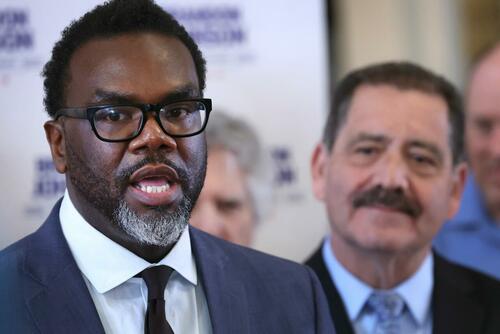
Residents of the Democratic stronghold of Chicago just elected another Democrat Mayor to replace Lori Lightfoot...
Sick Of Same Old Crime And Violence, Chicago Tries Electing A Democrat This Time https://t.co/QXuN09JTVc
— The Babylon Bee (@TheBabylonBee) April 5, 2023
...yet, instead of perhaps voting for a centrist, mayor-elect Brandon Johnson is anything but - and the city is now bracing for more taxes.
As Bloomberg notes;
The mayor-elect’s proposed levies on corporations, financial securities and the rich would add pressure on the business community in the nation’s third-largest city that’s already grappling with rising crime, high-profile headquarter departures and fragile finances.
"He wants to put more of the burden on the business community," said Richard Caccarone, president-emeritus of municipal bond research firm, Merritt Research Services. "There’s some anxiety about the approach that he’ll use and solutions. You don’t want to start a negative spiral."
Johnson's unexpected victory on Tuesday comes as the city's finances are under increasing strain - with pension funds short $34 billion as the city projects a $474 million deficit. In short, Chicago - which has been slower to recover from the pandemic than most other major cities - has to manage its way out of a mess amid high crime and several high-profile corporations bailing for greener (and safer, and lower-tax) pastures.
During his campaign, Johnson proposed $800 million in new taxes, without raising property levies, to deal with the deficit and invest in residents and neighborhoods across the city, not just downtown.
He also favors a $4-per-employee tax on large companies that have at least half of their operations in Chicago and has floated taxes on airlines that pollute the city’s air. Additionally, his plan includes a $1 or $2 tax per securities-trading contract — a measure opposed by Chicago’s iconic exchange giants, CME Group Inc. and Cboe Global Markets Inc. -Bloomberg
According to a spokesperson from CBOE, a securities tax would "only cause considerable harm," on top of an environment where many traders have already relocated to other states such as Florida, Colorado and Tennessee.
"So if you’re going to tell the last remaining people that they are going to pay a $1 a contract, the floor would close overnight," said P.J. Quaid, a senior vice president at R.J. O’Brien, adding "It’s just another piece of private industry that would be decimated by these tax policies."
The feasibility of Johnson's plan will be examined by the Civic Federation, which is tasked with tracking the city's finances.
Meanwhile, Chicago will also fall under scrutiny from ratings agencies, and is being closely watched by investment managers.
"We’re hopeful mayor-elect Johnson will maintain fiscal discipline and continue on the path that earned the city several credit-rating upgrades last year,: said Nuveen senior muni analyst Molly Shellhorn. "Investors will be looking for additional detail on the potential impacts of some of Johnson’s new tax proposals."
Residents of the Democratic stronghold of Chicago just elected another Democrat Mayor to replace Lori Lightfoot…
Sick Of Same Old Crime And Violence, Chicago Tries Electing A Democrat This Time https://t.co/QXuN09JTVc
— The Babylon Bee (@TheBabylonBee) April 5, 2023
…yet, instead of perhaps voting for a centrist, mayor-elect Brandon Johnson is anything but – and the city is now bracing for more taxes.
As Bloomberg notes;
The mayor-elect’s proposed levies on corporations, financial securities and the rich would add pressure on the business community in the nation’s third-largest city that’s already grappling with rising crime, high-profile headquarter departures and fragile finances.
“He wants to put more of the burden on the business community,” said Richard Caccarone, president-emeritus of municipal bond research firm, Merritt Research Services. “There’s some anxiety about the approach that he’ll use and solutions. You don’t want to start a negative spiral.”
Johnson’s unexpected victory on Tuesday comes as the city’s finances are under increasing strain – with pension funds short $34 billion as the city projects a $474 million deficit. In short, Chicago – which has been slower to recover from the pandemic than most other major cities – has to manage its way out of a mess amid high crime and several high-profile corporations bailing for greener (and safer, and lower-tax) pastures.
During his campaign, Johnson proposed $800 million in new taxes, without raising property levies, to deal with the deficit and invest in residents and neighborhoods across the city, not just downtown.
He also favors a $4-per-employee tax on large companies that have at least half of their operations in Chicago and has floated taxes on airlines that pollute the city’s air. Additionally, his plan includes a $1 or $2 tax per securities-trading contract — a measure opposed by Chicago’s iconic exchange giants, CME Group Inc. and Cboe Global Markets Inc. -Bloomberg
According to a spokesperson from CBOE, a securities tax would “only cause considerable harm,” on top of an environment where many traders have already relocated to other states such as Florida, Colorado and Tennessee.
“So if you’re going to tell the last remaining people that they are going to pay a $1 a contract, the floor would close overnight,” said P.J. Quaid, a senior vice president at R.J. O’Brien, adding “It’s just another piece of private industry that would be decimated by these tax policies.”
The feasibility of Johnson’s plan will be examined by the Civic Federation, which is tasked with tracking the city’s finances.
Meanwhile, Chicago will also fall under scrutiny from ratings agencies, and is being closely watched by investment managers.
“We’re hopeful mayor-elect Johnson will maintain fiscal discipline and continue on the path that earned the city several credit-rating upgrades last year,: said Nuveen senior muni analyst Molly Shellhorn. “Investors will be looking for additional detail on the potential impacts of some of Johnson’s new tax proposals.”
Loading…





